Tara Chevrestt's Blog, page 45
September 15, 2014
Her Brilliant Career: Ten Extraordinary Women of the Fifties by Rachel Cooke
 The book title is rather self-explanatory. You know what this one is about. Ten women with brilliant careers in the fifties. As usual with a biography, half of it bored me; and half of it was intriguing. No offense to anyone, but a woman who wrote a cookbook doesn't interest me much; neither does a gardener. But some of the women featured in this book really did interest me and made for good reading:
The book title is rather self-explanatory. You know what this one is about. Ten women with brilliant careers in the fifties. As usual with a biography, half of it bored me; and half of it was intriguing. No offense to anyone, but a woman who wrote a cookbook doesn't interest me much; neither does a gardener. But some of the women featured in this book really did interest me and made for good reading:Sheila van Damm: race-car driver and nightclub manager.
What interested me about her is that she felt great fear before racing. Racing in the fifties was not as "safe" as it is today. The book points this out with hard facts about deaths, not only of drivers but of bystanders being decapitated by flying debris and death from car fires. It was a serious and deadly business and though she was afraid, van Damm kept driving, even entering the most dangerous race in the world. And even better, she was known for finishing every one, no matter her placing. She was also a pilot. When her dad said he wanted to start a charter company and told her to "Go and learn to fly," she did just that. Though it was a failed business, again, this woman faced her fears. She even joined the Volunteer RAF Reserve.
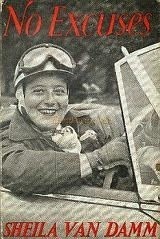
Before rally races, she worked as a driver in the Women’s Auxiliary Air Force.
Her side business, her dad's business that she later took over, was running a club called The Windmill. The bits about the club itself really hooked me, even when they weren't related to van Damm herself. Such as the fact they could have nude girls, provided they didn't move, so that women were nude but stood frozen for 12 minutes--except during a particular bad bombing in the Blitz, when one nude girl wearing nothing but a hat broke the rule by thumbing her nose at the planes above.
Also of interest to me are the lady film directors. Muriel Box, according to this book, was a feminist and if you watch her movies and are savvy enough, you'll detect a feminist message/undertone in the films.
Matter of fact, I'm going to watch one of the movies directed by her this week--the only one I could find here in the States available to me, The Truth About Women.
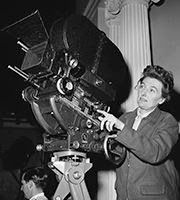 Here is another example of a woman who refuses to give up. While critics were sneering about her last movie, she was hard at work on the next one. It was not a welcoming industry to women in those days--is it now either? I know Hollywood is def male-dominated...
Here is another example of a woman who refuses to give up. While critics were sneering about her last movie, she was hard at work on the next one. It was not a welcoming industry to women in those days--is it now either? I know Hollywood is def male-dominated...An interesting bit in the book tells about how the film industry came to her, which is very cool because she'd always wanted to work with movies, and one day she meets the right person on a train... I also liked reading about how this woman just walked out of her family home with nothing but a bag, and made good for herself.
She later started her own feminist publishing company, Femina. This "chapter" also introduces us to Betty Box, Muriel's SIL and a movie producer. TBH, I lost interest in the women themselves as I read this and began looking up all their movies as I'm an old-movie buff. I'm sad to say I can't find some of them available for viewing. Namely, Both Sides of the Law AKA Street Corner. Someone, please, make this movie available on streaming or even TCM.
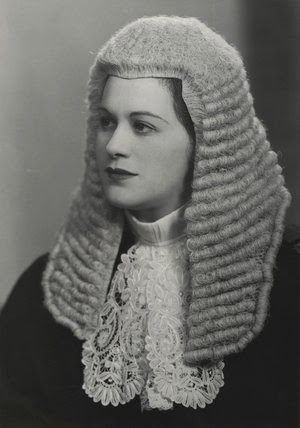 Moving on, another woman I enjoyed reading about is England's first woman judge, Rose Heilbron. Here is a strong woman who maintained her femininity while rising from lawyer to judge. After her mother's death long before, she put her own dreams on hold to help her family. Something particularly touching she did was to rent a wig and gown and appear at her deceasing mother's bedside, as she knew her mother would not live long enough to actually see her daughter succeed. Her chapter starts with the relating of an interesting case about a burned houseboat. She had one daughter and after the difficult birth, was back in court in just 6 weeks, and this after nearly dying.
Moving on, another woman I enjoyed reading about is England's first woman judge, Rose Heilbron. Here is a strong woman who maintained her femininity while rising from lawyer to judge. After her mother's death long before, she put her own dreams on hold to help her family. Something particularly touching she did was to rent a wig and gown and appear at her deceasing mother's bedside, as she knew her mother would not live long enough to actually see her daughter succeed. Her chapter starts with the relating of an interesting case about a burned houseboat. She had one daughter and after the difficult birth, was back in court in just 6 weeks, and this after nearly dying.I enjoyed reading about a few of these women, but must confess like many biographies (and the reason I tend to avoid them) it drops fact after fact after fact in a manner in which we can't possibly remember half of it. Also, a few of the women seemed unlikable to me, flitting around lover to lover, hurting many people as they go. Is it admirable that they saw what they wanted and took it? Yes, but it's hard to read about people you probably wouldn't stand in real life. I'm not sure I would have chosen some of the women featured myself.

Published on September 15, 2014 00:00
September 14, 2014
Belle: A Magical Feel-Good Movie About Humanity and Love
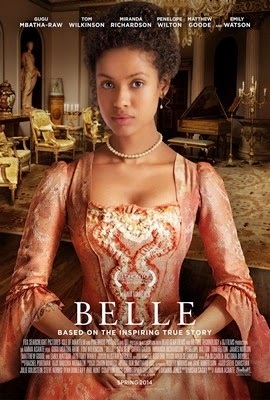 "Laws that allow us to diminish the humanity of anybody are not laws. They are frameworks for crime."
"Laws that allow us to diminish the humanity of anybody are not laws. They are frameworks for crime."I love a good period drama, but I especially love a good period drama that actually teaches me about something that occurred in history that until now, I never knew about. This is the case with Belle. It's not just a story of a mulatto woman being raised among the lords and ladies, but also the story of the Zong, a slave ship on which traumatic circumstances caused it to be a crucial step in abolishing the slave trade.
On the Zong, the traders claim to have ran out of water, a huge problem for ships in the 1700s. They had a LONG way to go. They threw the slaves overboard, chained to one another, to drown, and wrote it off as "lost cargo" and a "must in order to save the lives of seamen" aka white men.
Once back on English soil, they tried to claim insurance money for the dead slaves.
And this "lack of water" excuse passed muster in the low courts, but when it made it to the high courts, it was another story. Some facts came to light...and in order not to spoil the movie for those of you who haven't seen it, that's all I'm going to say on that. However, Belle's caregiver/uncle is the judge overseeing this case.
Behind his back, Belle is trying to do whatever she can to ensure the outcome does not go in the traders' favor. Meanwhile, a wealthy man is trying to win her hand and she believes it's her only chance to marry, because despite her wealth, most English gentlemen won't marry a woman of color. But can she act as though her Negro mother is a shameful secret? Can she shun her heritage?
It's very interesting to see what happens. I was holding my breath and at one point--the end--actually shed tears of happiness. I became quite engrossed in this tale. It's true, by the way. It's based on a real woman. Also cool to watch was how the family changed from being, "But she's a Negro! You failed to mention that. We can't raise her in this house" to "She's one of us" despite the fact they wouldn't let her eat at their dinner table.
That brings me to some things that confused me and thus knock off a bike. If they love her so much, if they accept her as they seem to, why is she eating alone still? If her father loved her mother as much as he claimed to, why was she living in the slums? And why in the world was Belle so rude and nasty to the clergyman's son upon first meeting him?
But an inspiring movie. Belle was truly a strong woman who stood up for herself, her heart, and her beliefs.
I highly recommend this one. I rented this on Amazon.

Published on September 14, 2014 00:00
September 13, 2014
Louise's Blunder Unveils A Murderer in the Latest WWII Mystery by Sarah R. Shaber
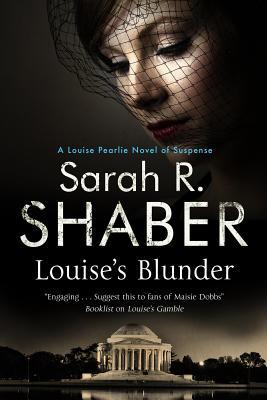 This is book four in the Louise Pearlie series. (I only read book three before reading this one and I haven't been one bit lost.) Louise is a woman who works for the OSS during WWII, in D.C. What's the OSS? I can't remember what exactly it stands for, but think of it as an early version of the NSA. Louise's official task: filing clerk, but what she really does is decipher and translate and record mysterious data and notes and whatnot from spies overseas and searches for spies here at home.
This is book four in the Louise Pearlie series. (I only read book three before reading this one and I haven't been one bit lost.) Louise is a woman who works for the OSS during WWII, in D.C. What's the OSS? I can't remember what exactly it stands for, but think of it as an early version of the NSA. Louise's official task: filing clerk, but what she really does is decipher and translate and record mysterious data and notes and whatnot from spies overseas and searches for spies here at home.What I really enjoy about this series, besides a heroine who knows her own mind, sticks up for others, and is intensely independent, is the historical setting. Through her we see the housing situation/rules in D.C. during that time, learn of all the political tension and how one must watch what they say, and meet a variety of characters. In this one we meet a returning war vet missing his arm and though it's a small side story, find out why he's so angry and tired of being asked about his Purple Heart.
Side stories such as his really happened and make for thought-evoking reading.
Ms. Shaber even managed to put bits of the racial tension/situation in the States in this installment. I applaud the author for keeping Louise at the homefront. Her series shows that there was a LOT going on here too during the war.
And as usual, Louise's file clerk duties get set to the side when a higher up asks her for some discreet help. A little blunder lands her on the case of a murdered man. Was he murdered? Or was it an accident? But if he wasn't murdered, where is his wallet? And why was he being investigated by the OSS?
Page by page, secrets are revealed, but never enough to make me solve the case. I love it when I have no clue whodunnit or am proved wrong. I like a good surprise. The case/story is topped off with a very intense storm, more bloodshed, and a fearful night during which I wasn't sure the Louise was going to get out of the mess this time...
Historical details: Well done. Excitement: Lots of it. Interesting characters: Many. Will I read the next book: Yes. Romance: Not this time. Quibble: Some things were repeated unnecessarily here and there.
I received this via Netgalley. And, oh! Be sure to read the author notes! Just a fabulous touch.

Published on September 13, 2014 00:00
September 12, 2014
The Poppy Factory by Liz Trenow: An Emotional Tale About the Effects of Shell Shock
 It's not only the visible injuries, but the invisible scars in their brains that they are having to cope with, even months after the war has ended.
It's not only the visible injuries, but the invisible scars in their brains that they are having to cope with, even months after the war has ended.The Poppy Factory is a powerful tale about shell shock and how no matter which war, no matter which branch of the military, no matter what your sex, it can affect anyone. Shell shock or PTSD does not discriminate.
The story goes back and forth between a modern-day heroine who has just returned from the Afghan war and is struggling in her relationships and the day-to-day life of being a paramedic. She's overtaken with rage, drowns herself in an alcoholic haze, and can't stop the nightmares and flashbacks. Could her great-great grandmother's diary, detailing the days after WWI and her husband's own struggles with PTSD be just what Jess needs to get back on track?
I think I preferred Rose's story and character more than Jess's. I am not overly fond of the diary method though. I would def have enjoyed the book more had Rose's story been a story (like Jess's) and not a diary. I still became completely immersed in it though. What I really liked the most about Rose's tale is how we see England right after WWI, the rationing, the emergence of the flapper era, the two-minute silence, the tomb of the unknown soldier, the spiritualists taking advantage of grieving women, discrimination against pregnant women in the work field, the origins and purpose of the poppy factor... Rose's tale, despite the diary telling of it, is so emotional. Rose herself is also just amazing...
I've grown up, become more self-reliant, tougher and less sentimental. I was just a girl, and now I feel much more like a woman, capable of making my own decisions, determining my own future...
...as she carries her husband and herself through bad times, gets work as a machinist, and unlike the love interest of the modern story, stands by her husband in bad times as well as good.
 Part of the poem by John McCraeMeanwhile, Jess's tale is self-pity and not much else. She has a flashback, cries, drinks, worries about her boyfriend, repeat. I'm not saying what she is feeling/going through isn't important--it is. But the historical story has so much more going on than just the issue of shell shock. It not only contains everything I mentioned above, but also a side drama involving a criminal/black marketeer. The modern story is strictly Jess's trauma. And her beau...honestly...if he can't stand with you during the bad times, then he's not worth keeping around for the good. "Go straighten yourself out first..." Whatever, dude. Jess's pining for him didn't win points with me. At the first sign of trouble, he dumped her. I say move on, girl.
Part of the poem by John McCraeMeanwhile, Jess's tale is self-pity and not much else. She has a flashback, cries, drinks, worries about her boyfriend, repeat. I'm not saying what she is feeling/going through isn't important--it is. But the historical story has so much more going on than just the issue of shell shock. It not only contains everything I mentioned above, but also a side drama involving a criminal/black marketeer. The modern story is strictly Jess's trauma. And her beau...honestly...if he can't stand with you during the bad times, then he's not worth keeping around for the good. "Go straighten yourself out first..." Whatever, dude. Jess's pining for him didn't win points with me. At the first sign of trouble, he dumped her. I say move on, girl.But Rose...what a woman and what a story. We could all learn from her. And. ladies, do take a moment to read up on Anna Guerin and Moina Michaels, the women who helped soldiers--either by honoring their memories or providing the disabled ones with minor labor, and the story behind the poppy being associated with the Great War soldiers. It's a beautiful, real-life story and you can read it here.
I received this via Netgalley.

Published on September 12, 2014 00:00
September 11, 2014
Extreme Sibling Rivalry Overshadows the Seriousness of War in The Winter Guest by Pam Jenoff
 "We are showing the Germans, and our people, that as long as there is spirit in the heart, we are not defeated."
"We are showing the Germans, and our people, that as long as there is spirit in the heart, we are not defeated."I rarely waste too much time on books I don't like, but I was curious enough about what was going to happen to Sam and Helena in this book, that even though I disliked it already at 17%, I kept chugging along, only to come to regret that decision.
Having read and enjoyed for the most part Ms. Jenoff's work before (see my review of the Ambassador's Daughter), I am surprised to be saying this, but I hated this book. Been a while since I disliked a book as much as I dislike this one, especially one I read all the way through. That being said, however, the fact I feel so strongly about it and what the characters do within its pages is actually a point in the author's favor. At least it evoked strong emotion in me.
I enjoyed Helena and her romance with Sam and this being a Harlequin book, I expected a nice romance, but something happens in the story that makes what starts beautiful turn into ugliness. I couldn't stomach it. There's a lot of things I can handle, but this was a sick twist I seriously disliked to the point it ruined the story for me. It was also utterly ridiculous. What woman is overtaken by lust at the sight of a man she doesn't know, who's hairy, stinky, and starved?
That being said, there's a war on, all right. It's Poland and the Germans/Nazis have taken over, the Jewish community is disbanded, trains are roaring past full of Jews on their way to the camps, there's very little food to be had, but in the middle of all this trauma and war, the book focuses on a stupid sibling rivalry and loads of resentment between two twin sisters. Sadly, that's where all the emotion of the story is: resentment between sisters. Helena resents that Ruth has been coddled, favored, considered prettier, etc. Ruth resents Helena having a romance while she's stuck at home raising three kids due their being orphaned. And it goes on and on.
I loathed, with an extreme passion, Ruth. What a horrid woman. I wanted to gouge her eyes out and sadly, she's half the story.
There are bad things happening and Helena witnesses them, yet there's so little emotion here that even things that should have been frightening just fell flat. Example: the hospital. You hide under the bed while a nurse is raped on top of it and it warrants a mere three or four sentences? Then it's never mentioned again? I would think the trauma of that would evoke a lot more reaction. As I said above, there's a lot more emotion when it comes to the sisters hating on each other or blabbering about their family history than actual traumatic events.
And Helena just traipses around all this danger unscathed. That was also a killer. I was like, seriously? Nobody stops to check your papers? You just waltz around the Jewish hospital, the ghetto, the blackmarket, and nothing happens? It's WWII, lady...and you're occupied.
And the ending....the book went on and on and on about their parents, their past, their surprising heritage (*****spoiler************************that's something else I didn't care for. How can one suddenly feel any passion about something they know nothing about? All of a sudden, you're Jewish when you know nothing about the religion?************) and yet the most important stuff was wrapped up in a few pages.
Just a disappointment for me.
I received an ARC of this via Netgalley.

Published on September 11, 2014 00:00
September 10, 2014
The Impersonator: A Historical Mystery Story that Toes the Line Between Vaudeville and Wealthy Society, Right and Wrong
 So she wasn't sweet and demure; she was scrappy and tough. I liked her all the more for it.
So she wasn't sweet and demure; she was scrappy and tough. I liked her all the more for it.Imagine being an actress hired to impersonate a missing/possibly dead heiress, while at the same time--as you pretend to be this woman, beguile and fool all her relatives, wear her clothes and jewelry--you try discreetly to get to the bottom of the big question: who killed the woman? 'Cause surely, she must be dead. After all, who doesn't claim a massive inheritance?
What a line to toe!
And that's just one of the many complications this heroine faces as she impersonates the missing heiress. She feels some strange connection to the missing girl, and perhaps wishes to atone for her great "sin" of impersonating her by finding out what really happened, but one can't go around asking, "So, did you kill me seven years ago?"
The setting is the twenties and goes back and forth between a fancy house on the cliffs with servants and a two-faced family (hey, not everyone is happy the heiress is back) and the city and vaudeville stage where the heroine goes to seek some assistance or ask questions.
There's a few dead bodies, a greedy uncle, some rather threatening cousins, poisoning, and mysterious caves. But what really made this story fun for me was how the heroine is constantly having to watch what she says. She's supposed to be a great equestrian, has to pretend to know this or that person and all their history...and at times I would grow tense with suspense. "How's she going to get out of this one?" And the heroine would "knock me dead" every time by "ad-libbing" her way out of a mess.
The ending...while who I'd fingered for the crime was indeed the one who did the crime, the book threw me enough twists that I began to doubt it was this person at times. Also found the not-related-to-the-murders bits in the end surprising, and pleasantly so.
Book two has the heroine in the silent-movie industry. You bet your bloomers I want to read that one. I'm looking forward to more of this series.
I nabbed this on Paperback Swap.

Published on September 10, 2014 00:00
September 9, 2014
Harvard Campus During WWI: A Place of Romance, Riots, and Conflicting Emotions in The End of Innoncence
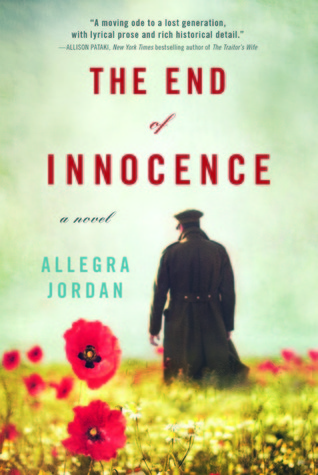
"He knows who I am and loves me for it. And I'm better for that."
I wasn't really sure what to expect from this one. I was drawn to this title because of the young lady attending Harvard (Radcliffe, actually) during WWI. Technically she can't attend Harvard--they didn't allow women--but she is permitted--invited--to attend one class on the exclusively male campus and there, she mingles with poets, playboys, and Germans, who during this time, were not quite welcome in the States anymore.
The campus is rife with hatred and students wishing to find someone to blame for the deaths of their loved ones overseas. This results in riots and beatings and needless to say, students of German origins are not safe. I found the story education in this aspect. Though I knew Germans faced hostility during this time period, their treatment on college campuses never really crossed my mind. I can't say it surprises me though. There's more than riots and rough "play" here too. There's "white collar" hatred going on as well, such as "I'll donate money to your college, but the German professor has to go..."
And witnessing all this is Helen, a young woman fresh in college, a smart lady who edits her father's books, is embarrassed by her mother's birth control pamphlets, and is falling in love for the first time after getting her head turned by a wrong fellow or two first. Though I wouldn't call her a suffragist as she doesn't seem to have strong feelings on the the subject, she isn't a doormat either. I'd say she's still finding herself as one moment she's racing a car and the next she is unable to make a man step off the hem of her skirt. But this is a confusing age to be and her characterization made sense.
I'd also just like to take a random moment here to say this is very well written. I loved the sudden surprise bursts of sarcastic humor that appeared here and there, making me chuckle and I also enjoyed how very poetic the prose is.
All that was beautiful was going. Like a garden that withdraws into the ground before a very long winter.
But I have some quibbles:
Wils seemed confused much of the time. One min he says Arnold isn't a murderer, the next he is. One minute the kaiser is ruining his life, the next he's saying he must fight for his country and won't denounce it... He seemed confused and thus confused me. But yet, at the same time, perhaps this is how it's supposed to feel. I would be confused too! Also, when in the world did a wedding occur? How did I miss that? (I read a digital galley and it's possible a scene was missing.) And later in the story why does Helen act like her and Copeland had only met in Wil's room? He was her professor too. So many little weird things.
I thought Helen's mother's "misdeeds" were quite fascinating. I wish she'd actually been a part of the story, that we'd experienced her presence.
The poetry readings and the literature discussions were--I'm embarrassed to admit this--somewhat over my head. The last 40% really bored me. It was just too much testosterone--it began to follow Riley and Wils in the trenches of war. I'm not into that. You've read one war scene, you've read them all--fear, trench foot, etc. Though I did enjoy the cease-fire despite the fact that wasn't new to me either. It was just neater this time around because Wils went look for Riley who was fighting on the opposite side and it warmed my heart reading about these Harvard students still enjoying mutual respect for each other even though they were trying to kill each other the day before...
And the ending...the last 20% was so disjointed and out of place (though I did enjoy the discussion with Copeland). Perhaps it went too far ahead into the future.
A nice read. I'll be watching for this author's next title. I received this via Netgalley.

Published on September 09, 2014 00:00
September 8, 2014
Visit Sunset Villa in Stranger At Sunset by Eden Baylee
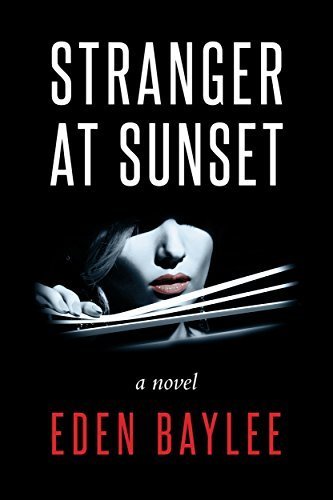 A vacation in Jamaica sounds like a great place to escape. Especially a visit to the Sunset Villa, which is the resort in this book
Stranger at Sunset.
A vacation in Jamaica sounds like a great place to escape. Especially a visit to the Sunset Villa, which is the resort in this book
Stranger at Sunset.
The writing pulled me into this story. The author writes very well and is easy to follow. I enjoyed her style and would read her again. Stranger At Sunset grabbed my attention starting with the blurb and in to the story. Over all, I enjoyed the story.
There were several point of views to keep up with and at times, I had a hard time, or even wondered why I needed to know what this person was doing on the vacation. I kept reading, figuring I would soon find out. This book was classified as a thriller/mystery. So as I read each scene, I figured there was a reason, the story was being set up. The thriller/mystery genre is one I enjoy a lot. I don't like to say anything negative, but the suspense didn't come in until about 80% of the book had been read, and even then within two chapters, the author let us know who the killer was. I would've liked to see the death come sooner and the suspense held out longer.
With that being said, I did still enjoy the story. I am curious about one of the characters, Kate, and what is in store for her next. The book ends leading me to believe that there will be another, but not in a cliff hanger type way. Everything in this story is tied up with a bow and resolved.
All in all, I would recommend this book to a reader who wants to step away from romance for a bit, and get to know a few sets of characters who have interesting lives. Many of the characters introduced in this story, I am curious where their lives have gone since vacation, so I'm curious to know if the author will use any of them in her next book.
My rating:

Vacation can be a killer.
Dr. Kate Hampton, a respected psychiatrist, gathers with a group of strangers at her favorite travel spot, Sunset Villa in Jamaica. Included in the mix are friends of the owners, a businessman with dubious credentials, and a couple who won the trip from a TV game show.
It is January 2013, following the aftermath of Hurricane Sandy. The luxury resort is struggling, not from the storm, but due to a scathing review from caustic travel writer, Matthew Kane. The owners have invited him back with hopes he will pen a more favorable review to restore their reputation.
Even though she is haunted by her own demons, Kate feels compelled to help. She sets out to discover the motivation behind Kane's vitriol. Used to getting what he wants, has the reviewer met his match in Kate? Or has she met hers?
Stranger at Sunset is a slow-burning mystery/thriller as seen through the eyes of different narrators, each with their own murky sense of justice. As Kate's own psychological past begins to unravel, a mysterious stranger at Sunset may be the only one who can save her.
Published on September 08, 2014 00:00
September 7, 2014
Edith Cavell: Nurse, Protector, Savior, POW
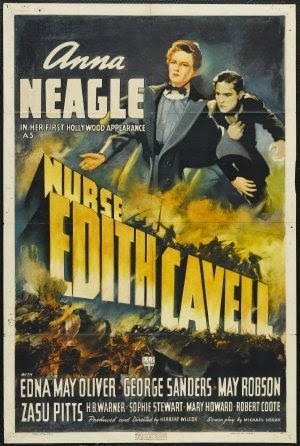 "Patriotism is not enough. I must have no hatred or bitterness towards anyone."
"Patriotism is not enough. I must have no hatred or bitterness towards anyone."I'd never heard of Edith Cavell until I found this movie on Amazon. She was a British nurse stationed in Belgium during WWI. During the German occupation, her hospital became a medical hub for German soldiers, as one was not supposed to harbor or care for French, British, any enemy of Germany. BUT she took in the wounded or even just the lost/escaped and hid them and treated them in the hospital cellar.
Between herself and others, she helped at least 200 Allied soldiers escape.
From History Channel's bio of her: "What Jeanne d’Arc has been for centuries to France," wrote one Allied journalist, "that will Edith Cavell become to the future generations of Britons."
The movie shows us all this and also how two other women helped her with her operation. (These ladies MAY have been contrived for the movie only. I do not know, but I'd like to think they existed too.) There's the feisty boat lady. I call her the boat lady because she and her husband stick the men in barrels and hide them on their boat and take them away. She's really ballsy and hands off incriminating postcards to German soldiers to mail for her. Perhaps overconfident, but it added a nice touch to the story.
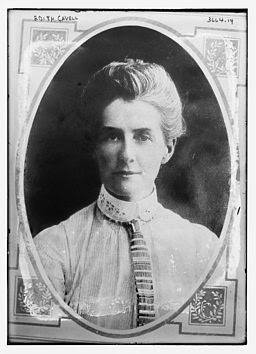 The real EdithThere's also a countess turned ambulance driver who blatantly protests the treatment of the POWs. Also in the movie is an old lady whose grandson aids them, but as for the old lady herself, I couldn't figure out how she was involved besides being hysterical.
The real EdithThere's also a countess turned ambulance driver who blatantly protests the treatment of the POWs. Also in the movie is an old lady whose grandson aids them, but as for the old lady herself, I couldn't figure out how she was involved besides being hysterical.Sadly, Edith is betrayed and busted. The new military command wished to make an example of her and twisted her deeds. Instead of acting from the kindness of her heart, which she was, they managed to get her a death sentence by twisting the charges. She was accused of providing the enemy with men to fight against Germany. While some of the men she saved probably did fight against Germany, many were too wounded.
She was executed by firing squad. The movie shows us this. This is a true story so I'm not spoiling anything here.
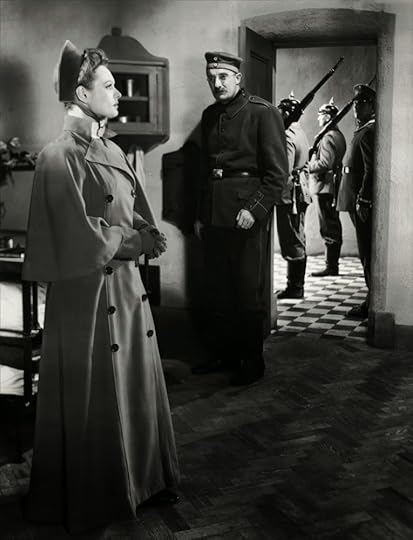 Movie EdithWhile I really appreciated this movie for the history and the remarkable woman it informed me about, I'm disappointed in some things. The picture is terrible, but that's to be expected. My screen was black half the time with nothing visible. Again, to be expected. It's old. (1939) What really bothered me however was the sound. Apparently the audio in this movie is so bad that even the captionist couldn't hear or understand it as every fourth or fifth word in my captions said, "Inaudible".
Movie EdithWhile I really appreciated this movie for the history and the remarkable woman it informed me about, I'm disappointed in some things. The picture is terrible, but that's to be expected. My screen was black half the time with nothing visible. Again, to be expected. It's old. (1939) What really bothered me however was the sound. Apparently the audio in this movie is so bad that even the captionist couldn't hear or understand it as every fourth or fifth word in my captions said, "Inaudible".My second and third complaints: 1. Perhaps the actress was told to be this way, but in my eyes, she was a robot most of the movie. There was probably only three scenes in which her character showed any emotion whatsoever. 2. I want to know what became of the other ladies. They were thrown in jail with her and then they were at her memorial service....why were they not punished too? A few weeks in jail compared to execution? I'd have liked that explained.
But to learn about this woman, I recommend watching this. I'd love to see it remade, actually.
I watched this via Amazon Prime.

Published on September 07, 2014 00:00
September 6, 2014
The Reading Radar
Spotted on GR Giveaways. A Light in the Wilderness by Jane Kirkpatrick.
 Letitia holds nothing more dear than the papers that prove she is no longer a slave. They may not cause white folks to treat her like a human being, but at least they show she is free. She trusts in those words she cannot read–as she is beginning to trust in Davey Carson, an Irish immigrant cattleman who wants her to come west with him.
Letitia holds nothing more dear than the papers that prove she is no longer a slave. They may not cause white folks to treat her like a human being, but at least they show she is free. She trusts in those words she cannot read–as she is beginning to trust in Davey Carson, an Irish immigrant cattleman who wants her to come west with him.
Nancy Hawkins is loathe to leave her settled life for the treacherous journey by wagon train, but she is so deeply in love with her husband that she knows she will follow him anywhere–even when the trek exacts a terrible cost.
Betsy is a Kalapuya Indian, the last remnant of a once proud tribe in the Willamette Valley in Oregon territory. She spends her time trying to impart the wisdom and ways of her people to her grandson. But she will soon have another person to care for.
As season turns to season, suspicion turns to friendship, and fear turns to courage, three spirited women will discover what it means to be truly free in a land that makes promises it cannot fulfill.
Based on a true story.
***
 Spotted on Edelweiss and a must read for me... Almost Famous Women by Megan Mayhew Bergman.
Spotted on Edelweiss and a must read for me... Almost Famous Women by Megan Mayhew Bergman.
From "a top-notch emerging writer with a crisp and often poetic voice and wily, intelligent humor" (The Boston Globe): a collection of stories that explores the lives of talented, gutsy women throughout history.
The fascinating lives of the characters in Almost Famous Women have mostly been forgotten, but their stories are burning to be told. Now Megan Mayhew Bergman, author of Birds of a Lesser Paradise, resurrects these women, lets them live in the reader's imagination, so we can explore their difficult choices. Nearly every story in this dazzling collection is based on a woman who attained some celebrity—she raced speed boats or was a conjoined twin in show business; a reclusive painter of renown; a member of the first all-female, integrated swing band. We see Lord Byron's illegitimate daughter, Allegra; Oscar Wilde's troubled niece, Dolly; West With the Night author Beryl Markham; Edna St. Vincent Millay's sister, Norma. These extraordinary stories travel the world, explore the past (and delve into the future), and portray fiercely independent women defined by their acts of bravery, creative impulses, and sometimes reckless decisions.
The world hasn't always been kind to unusual women, but through Megan Mayhew Bergman's alluring depictions they finally receive the attention they deserve. Almost Famous Women is a gorgeous collection from an "accomplished writer of short fiction"
***
Spotted on my favorite blog, Reading the Past, Sisters of Shiloh has come to my attention. It's penned about two sisters BY two sisters. (Also check out her post to see a list of other books that has a similar theme.)
 A best-selling novelist enlists her own sister to bring us the story of two Southern sisters, disguised as men, who join the Confederate Army—one seeking vengeance on the battlefield, the other finding love.
A best-selling novelist enlists her own sister to bring us the story of two Southern sisters, disguised as men, who join the Confederate Army—one seeking vengeance on the battlefield, the other finding love.
In a war that pitted brother against brother, two sisters choose their own battle.
Joseph and Thomas are fresh recruits for the Confederate Army, daring to join the wild fray that has become the seemingly endless Civil War, sharing everything with their fellow soldiers—except the secret that would mean their undoing: they are sisters.
Before the war, Joseph and Thomas were Josephine and Libby. But that bloodiest battle, Antietam, leaves Libby to find her husband, Arden, dead. She vows vengeance, dons Arden’s clothes, and sneaks off to enlist with the Stonewall Brigade, swearing to kill one Yankee for every year of his too-short life. Desperate to protect her grief-crazed sister, Josephine insists on joining her. Surrounded by flying bullets, deprivation, and illness, the sisters are found by other dangers: Libby is hurtling toward madness, haunted and urged on by her husband’s ghost; Josephine is falling in love with a fellow soldier. She lives in fear both of revealing their disguise and of losing her first love before she can make her heart known to him.
In her trademark “vibrant” (Washington Post Book World) and “luscious” (Atlanta Journal-Constitution) prose, Kathy Hepinstall joins with her sister Becky to show us the hopes of love and war, the impossible-to-sever bonds of sisterhood, and how what matters most can both hurt us and heal us.
***
How this released in 2009 and I never heard of it 'til now, I'll never know, but after seeing book four is coming out on Amazon soon, I went looking for book one and this hit the wishlist. Alaska Virgin Air by Izzy Ballard.
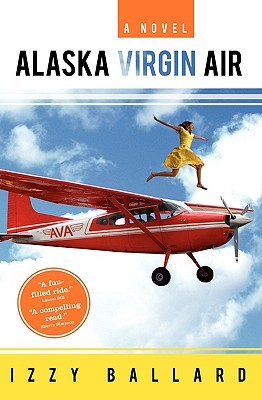 Fairbanks, Alaska? Adventure. 40 below zero. Bears, moose . . . husband-school dropout of an ex. Yikes! Abigail Vertuccio has three goals in life. One. Don't let people find out about her infuriating habit of seeing the future. Two. Stop seeing the future. Three. Get as far away from Fairbanks, Alaska as she can. She thought she'd succeeded when she hopped in her ancient motor home, Big Ellie, and hit the road. Only now she's back - Grandma's orders - to help run the family rural air service, Alaska Virgin Air. Home only a week, Abbey stumbled onto a plot to destroy the family business. Never one to leave matters to the experts, she and two of her zanier friends orchestrate a counter-attack of stakeouts and spying that has even the Alaska State Troopers rolling in the aisles. Despite all her efforts, she's batting zero on the spy front. Someone's trying to kill her. As if that isn't bad enough, things with her ex are alternately heating up and scaring the hell out of her. At this point, she has only one question. What are the chances she'll end up in someone's bed, married again, or just plain dead? Okay. Two questions. What the hell good is being clairvoyant if it never seems to work when she really, really wants it to?
Fairbanks, Alaska? Adventure. 40 below zero. Bears, moose . . . husband-school dropout of an ex. Yikes! Abigail Vertuccio has three goals in life. One. Don't let people find out about her infuriating habit of seeing the future. Two. Stop seeing the future. Three. Get as far away from Fairbanks, Alaska as she can. She thought she'd succeeded when she hopped in her ancient motor home, Big Ellie, and hit the road. Only now she's back - Grandma's orders - to help run the family rural air service, Alaska Virgin Air. Home only a week, Abbey stumbled onto a plot to destroy the family business. Never one to leave matters to the experts, she and two of her zanier friends orchestrate a counter-attack of stakeouts and spying that has even the Alaska State Troopers rolling in the aisles. Despite all her efforts, she's batting zero on the spy front. Someone's trying to kill her. As if that isn't bad enough, things with her ex are alternately heating up and scaring the hell out of her. At this point, she has only one question. What are the chances she'll end up in someone's bed, married again, or just plain dead? Okay. Two questions. What the hell good is being clairvoyant if it never seems to work when she really, really wants it to?
***
To Find a Mountain by Dani Amore was spotted on NG.
 Benedetta Carlessimo is no stranger to hardship. Ever since her mother died, the sixteen-year-old Italian girl has cared for her rambunctious younger siblings without complaint. Then World War II arrives on her doorstep, leaving her face-to-face with the most terrible evil she has ever witnessed.
Benedetta Carlessimo is no stranger to hardship. Ever since her mother died, the sixteen-year-old Italian girl has cared for her rambunctious younger siblings without complaint. Then World War II arrives on her doorstep, leaving her face-to-face with the most terrible evil she has ever witnessed.
With the Germans and Americans fighting furiously to control a strategic swath of Italy, Nazi forces seize Benedetta's village, turning her home into a command center?and forcing her beloved father to choose between fleeing or fighting on the front lines.
In the midst of great deprivation, Benedetta struggles to feed both her family and the Nazis, all the while keeping her father's whereabouts secret. Yet her blossoming love for a handsome young Italian man hiding in the mountains brings a sliver of joy to her life. But with the Americans advancing and the Germans growing increasingly desperate and cruel, Benedetta knows that one misstep could bring horrible repercussions?and only an extraordinary act of courage can save her family.
 Letitia holds nothing more dear than the papers that prove she is no longer a slave. They may not cause white folks to treat her like a human being, but at least they show she is free. She trusts in those words she cannot read–as she is beginning to trust in Davey Carson, an Irish immigrant cattleman who wants her to come west with him.
Letitia holds nothing more dear than the papers that prove she is no longer a slave. They may not cause white folks to treat her like a human being, but at least they show she is free. She trusts in those words she cannot read–as she is beginning to trust in Davey Carson, an Irish immigrant cattleman who wants her to come west with him.Nancy Hawkins is loathe to leave her settled life for the treacherous journey by wagon train, but she is so deeply in love with her husband that she knows she will follow him anywhere–even when the trek exacts a terrible cost.
Betsy is a Kalapuya Indian, the last remnant of a once proud tribe in the Willamette Valley in Oregon territory. She spends her time trying to impart the wisdom and ways of her people to her grandson. But she will soon have another person to care for.
As season turns to season, suspicion turns to friendship, and fear turns to courage, three spirited women will discover what it means to be truly free in a land that makes promises it cannot fulfill.
Based on a true story.
***
 Spotted on Edelweiss and a must read for me... Almost Famous Women by Megan Mayhew Bergman.
Spotted on Edelweiss and a must read for me... Almost Famous Women by Megan Mayhew Bergman.From "a top-notch emerging writer with a crisp and often poetic voice and wily, intelligent humor" (The Boston Globe): a collection of stories that explores the lives of talented, gutsy women throughout history.
The fascinating lives of the characters in Almost Famous Women have mostly been forgotten, but their stories are burning to be told. Now Megan Mayhew Bergman, author of Birds of a Lesser Paradise, resurrects these women, lets them live in the reader's imagination, so we can explore their difficult choices. Nearly every story in this dazzling collection is based on a woman who attained some celebrity—she raced speed boats or was a conjoined twin in show business; a reclusive painter of renown; a member of the first all-female, integrated swing band. We see Lord Byron's illegitimate daughter, Allegra; Oscar Wilde's troubled niece, Dolly; West With the Night author Beryl Markham; Edna St. Vincent Millay's sister, Norma. These extraordinary stories travel the world, explore the past (and delve into the future), and portray fiercely independent women defined by their acts of bravery, creative impulses, and sometimes reckless decisions.
The world hasn't always been kind to unusual women, but through Megan Mayhew Bergman's alluring depictions they finally receive the attention they deserve. Almost Famous Women is a gorgeous collection from an "accomplished writer of short fiction"
***
Spotted on my favorite blog, Reading the Past, Sisters of Shiloh has come to my attention. It's penned about two sisters BY two sisters. (Also check out her post to see a list of other books that has a similar theme.)
 A best-selling novelist enlists her own sister to bring us the story of two Southern sisters, disguised as men, who join the Confederate Army—one seeking vengeance on the battlefield, the other finding love.
A best-selling novelist enlists her own sister to bring us the story of two Southern sisters, disguised as men, who join the Confederate Army—one seeking vengeance on the battlefield, the other finding love.In a war that pitted brother against brother, two sisters choose their own battle.
Joseph and Thomas are fresh recruits for the Confederate Army, daring to join the wild fray that has become the seemingly endless Civil War, sharing everything with their fellow soldiers—except the secret that would mean their undoing: they are sisters.
Before the war, Joseph and Thomas were Josephine and Libby. But that bloodiest battle, Antietam, leaves Libby to find her husband, Arden, dead. She vows vengeance, dons Arden’s clothes, and sneaks off to enlist with the Stonewall Brigade, swearing to kill one Yankee for every year of his too-short life. Desperate to protect her grief-crazed sister, Josephine insists on joining her. Surrounded by flying bullets, deprivation, and illness, the sisters are found by other dangers: Libby is hurtling toward madness, haunted and urged on by her husband’s ghost; Josephine is falling in love with a fellow soldier. She lives in fear both of revealing their disguise and of losing her first love before she can make her heart known to him.
In her trademark “vibrant” (Washington Post Book World) and “luscious” (Atlanta Journal-Constitution) prose, Kathy Hepinstall joins with her sister Becky to show us the hopes of love and war, the impossible-to-sever bonds of sisterhood, and how what matters most can both hurt us and heal us.
***
How this released in 2009 and I never heard of it 'til now, I'll never know, but after seeing book four is coming out on Amazon soon, I went looking for book one and this hit the wishlist. Alaska Virgin Air by Izzy Ballard.
 Fairbanks, Alaska? Adventure. 40 below zero. Bears, moose . . . husband-school dropout of an ex. Yikes! Abigail Vertuccio has three goals in life. One. Don't let people find out about her infuriating habit of seeing the future. Two. Stop seeing the future. Three. Get as far away from Fairbanks, Alaska as she can. She thought she'd succeeded when she hopped in her ancient motor home, Big Ellie, and hit the road. Only now she's back - Grandma's orders - to help run the family rural air service, Alaska Virgin Air. Home only a week, Abbey stumbled onto a plot to destroy the family business. Never one to leave matters to the experts, she and two of her zanier friends orchestrate a counter-attack of stakeouts and spying that has even the Alaska State Troopers rolling in the aisles. Despite all her efforts, she's batting zero on the spy front. Someone's trying to kill her. As if that isn't bad enough, things with her ex are alternately heating up and scaring the hell out of her. At this point, she has only one question. What are the chances she'll end up in someone's bed, married again, or just plain dead? Okay. Two questions. What the hell good is being clairvoyant if it never seems to work when she really, really wants it to?
Fairbanks, Alaska? Adventure. 40 below zero. Bears, moose . . . husband-school dropout of an ex. Yikes! Abigail Vertuccio has three goals in life. One. Don't let people find out about her infuriating habit of seeing the future. Two. Stop seeing the future. Three. Get as far away from Fairbanks, Alaska as she can. She thought she'd succeeded when she hopped in her ancient motor home, Big Ellie, and hit the road. Only now she's back - Grandma's orders - to help run the family rural air service, Alaska Virgin Air. Home only a week, Abbey stumbled onto a plot to destroy the family business. Never one to leave matters to the experts, she and two of her zanier friends orchestrate a counter-attack of stakeouts and spying that has even the Alaska State Troopers rolling in the aisles. Despite all her efforts, she's batting zero on the spy front. Someone's trying to kill her. As if that isn't bad enough, things with her ex are alternately heating up and scaring the hell out of her. At this point, she has only one question. What are the chances she'll end up in someone's bed, married again, or just plain dead? Okay. Two questions. What the hell good is being clairvoyant if it never seems to work when she really, really wants it to?***
To Find a Mountain by Dani Amore was spotted on NG.
 Benedetta Carlessimo is no stranger to hardship. Ever since her mother died, the sixteen-year-old Italian girl has cared for her rambunctious younger siblings without complaint. Then World War II arrives on her doorstep, leaving her face-to-face with the most terrible evil she has ever witnessed.
Benedetta Carlessimo is no stranger to hardship. Ever since her mother died, the sixteen-year-old Italian girl has cared for her rambunctious younger siblings without complaint. Then World War II arrives on her doorstep, leaving her face-to-face with the most terrible evil she has ever witnessed.With the Germans and Americans fighting furiously to control a strategic swath of Italy, Nazi forces seize Benedetta's village, turning her home into a command center?and forcing her beloved father to choose between fleeing or fighting on the front lines.
In the midst of great deprivation, Benedetta struggles to feed both her family and the Nazis, all the while keeping her father's whereabouts secret. Yet her blossoming love for a handsome young Italian man hiding in the mountains brings a sliver of joy to her life. But with the Americans advancing and the Germans growing increasingly desperate and cruel, Benedetta knows that one misstep could bring horrible repercussions?and only an extraordinary act of courage can save her family.
Published on September 06, 2014 00:00



